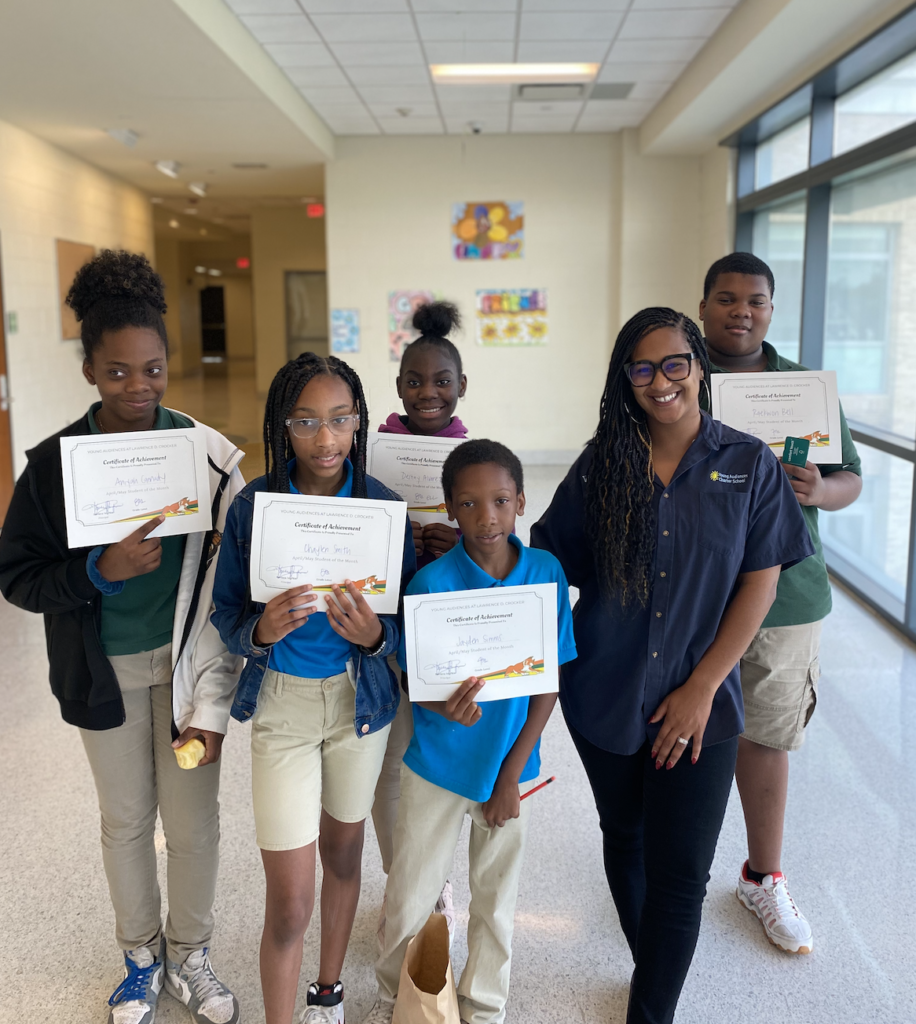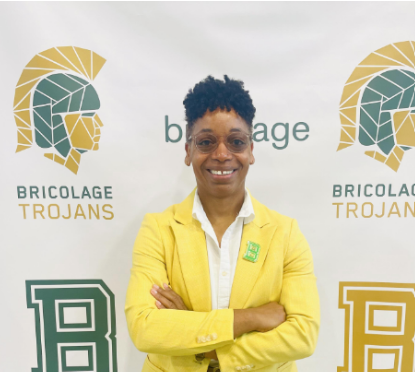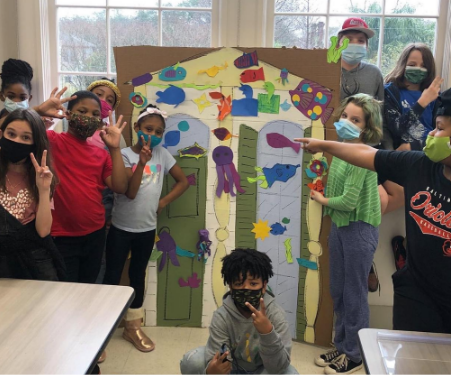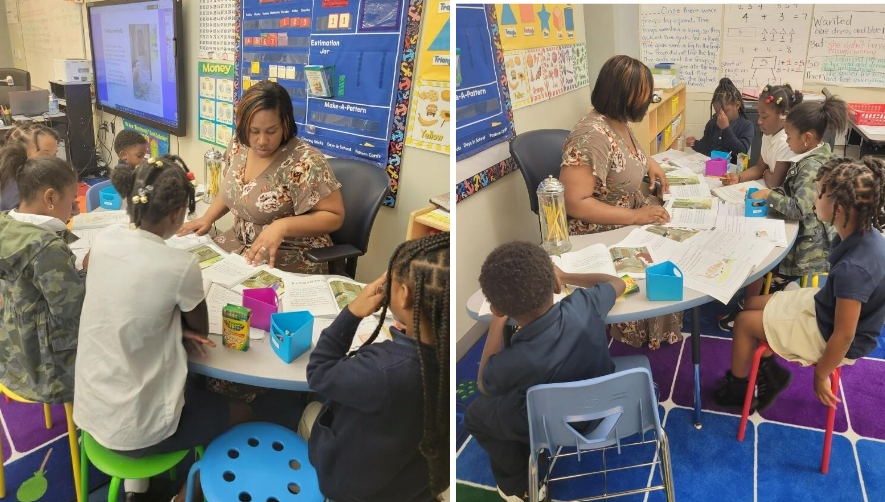At NSNO, we work with schools in many different ways. Through our Instructional Quality Initiative, our Schools Team brings teachers together from across the city for professional development “hubs” and collaboratives. We also help schools purchase high-quality curriculum to use in their classrooms.
Our Talent team works directly with teachers as well as current and aspiring school and network leaders through programs like the Novice Leader Academy, E3, and the The New Orleans Teacher Community.
As we run these programs and offer these supports, we connect with educators about their students, schools, and the strategies they use. We believe in sharing what works across our system so that our schools can grow together. Over the rest of the school year, we’ll be highlighting the reflections of some schools that NSNO works supports, and that volunteered to discuss experiences and strategies with our Talent and Schools teams.
It’s a critical time in education. Across the city and nation, schools have been working hard to catch up from the academic impact of the pandemic–and here in New Orleans, the lost time after Hurricane Ida. After a dip in LEAP scores during the pandemic, last year, schools in our city saw a small improvement.
We’re proud to work closely with our schools and educators. We believe in them, and we know their work is complex. They face real challenges as we continue to emerge from the lost time of the pandemic and Hurricane Ida. We are their partners, supporters, and advocates.
Bright Spot: Young Audiences Charter Schools at Lawrence D. Crocker
NSNO is grateful to partner with Young Audiences Charter Schools at Lawrence D. Crocker in many ways. Crocker received NSNO funding for high quality “Tier 1” curriculum and participated in NSNO’s professional development “literacy collaborative.” Their principal, Xaviera Ingram, is a member of the Novice Leader Academy (NLA) and their Chief Academic Officer, Brionne Marcelle, is an E3 fellow. We spoke to fourth grade English Language Arts teacher Tiffony Pierce about one of her philosophies as an educator.

The Takeaway
Ms. Pierce believes in empowering students as critical thinkers through questioning and discussion. This is crucial both for their personal academic development and for success on complex grade level standards in ELA.
“I try to always use the four principles of engagement…it involves empowering students to become critical thinkers by teaching them that the teacher doesn’t have all the answers. We come to a higher level of understanding through conversation, through questioning, through the power of discussion–and these things help us to arrive at a better understanding of what’s going on in the world around us…I don’t want to have robots–I want to have thinkers in my class. I want to encourage them to think on their own.” – Tiffony Pierce, 4th Grade ELA, Lawrence D. Crocker
Bright spot: Bricolage Academy
NSNO is grateful to partner with Bricolage in many ways. Bricolage received NSNO funding for high quality “Tier 1” curriculum and participated in NSNO’s professional development “hubs” focused on special education and data. Their CEO, Antigua Wilbern, is part of NSNO’s E3 program for new and aspiring network leaders.
Bricolage was among the top ten open-enrollment schools citywide with the highest percentage of students earning Mastery on the leap last year. In 4th grade ELA, 60% of students earned Mastery.


The takeaway: Bricolage invested its entire team in both the importance of data-driven instruction and understanding each child’s unique needs.
“There’s not a teacher in this building that if you go talk to them about an individual kid, can’t tell you how they performed on the LEAP, can’t tell you how many points from mastery they are, can’t tell you what they do during the Personalized Learning block. Data meetings become real accountable meetings in this way, because people know kids.” – Antigua Wilbern, CEO, Bricolage Academy, 2020 E3 Fellow
Bright Spot: Lafayette Academy Lower School
NSNO is grateful to partner with Lafayette Academy in many ways. Lafayette Academy Lower School received NSNO funding for high quality “Tier 1” curriculum and participated in NSNO’s professional development literacy “hub” and data collaborative. We spoke with Oneka Griggley, a second grade teacher at Lafayette with over two decades of experience. Ms. Griggley has been participating in the literacy hub for the past two years, and she discussed how the hub’s focus on the “science of reading” has transformed her classroom.
Second grade students at Lafayette grew in reading this fall at an above-average rate in comparison to statewide data. Congratulations, Lafayette!

Ms. Griggley uses “science of reading” strategies, like a focus on phonemic awareness, to help her students grow as readers and empower them to tackle words they don’t know.
As she put it,”With the science of reading, the ultimate goal is for students to become skilled readers. It’s a combination of language comprehension and word recognition; you cannot have one without the other. We know students must have phonemic awareness in order to read and spell words. There has to be daily phonics lessons for every student in the class, no matter the level or the stage that they’re in for reading–everyone should be getting daily phonics instruction. Instead of just giving them a little bit of a clue, or checking the picture to help them get through a book, we are giving them instructions on the phonemes and graphemes. So that when they get to those tricky words in any text, they will have tools to sound those words out.
I have observed my students gaining confidence and being successful in their abilities to read and spell words. We celebrate small wins and have a daily “Spotlight Reader!” Students are excited to sign-up and show off their ability!” – Oneka Griggley, 2nd grade teacher at Lafayette Academy Lower School, participant in NSNO’s literacy hub
Bright Spot: Mary McLeod Bethune Elementary Charter School
NSNO is grateful to partner with Bethune in many ways. Bethune received NSNO funding for high quality “Tier 1” curriculum. They are currently participating in NSNO’s professional development collaboratives focused on foundational (K-2) literacy and 3-8th grade literacy. Last year, they were also a part of NSNO’s data collaborative.
Congratulations to Bethune’s 8th graders, who were in the top 10% for earning Mastery on the LEAP in English Language Arts last year!

Bethune’s focus on strong literacy strategies and great teaching is powerful. Bethune’s 8th grade students earn among the top ten open-enrollment schools in the district for Mastery on their LEAP in ELA.We spoke with Master Teacher Sherice Watson about the impact she sees this work have on her team and their students.
“They are aware of what that reading should look like on their particular grade levels and how it progresses,” she says. “Every skill, every sound is important. The great thing is the teachers see the impact. The research says it, and then when you do it yourself and see the impact, that’s the most rewarding point. The teachers are saying, ‘I love this program. I love that my students are able to read. I can’t believe how far they’ve come.’”